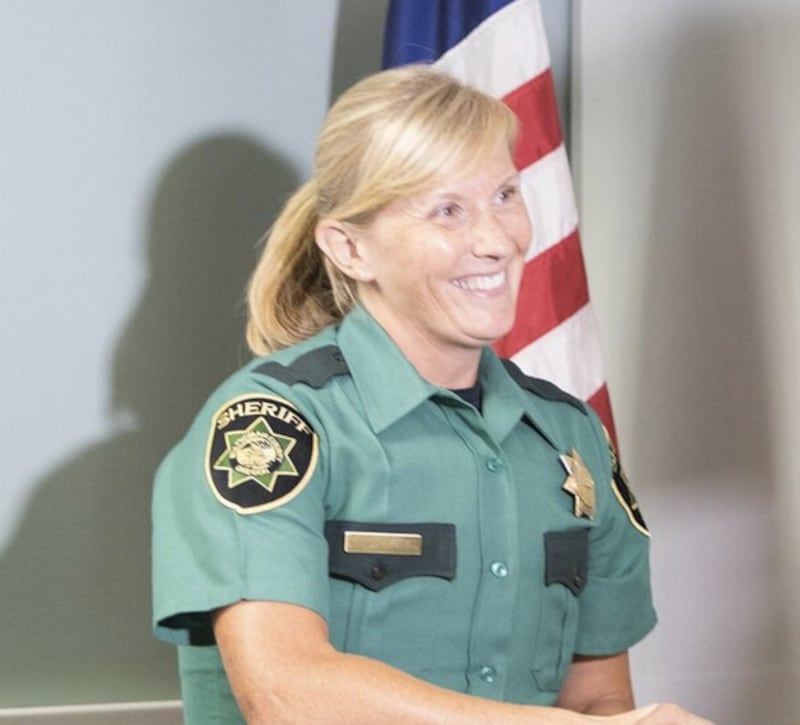Multnomah County Chair
Jessica Vega Pederson
Although the chair of the five-member Multnomah County Board of Commissioners gets less media coverage than the mayor of Portland, the county leader enjoys both more authority and, given the current division of duties, more say over the region’s most pressing issue: homelessness.
Unlike the mayor, who must delegate oversight of most city bureaus to the four other commissioners, the county chair retains supervision of both the budget and all county human services functions. (Law enforcement authority rests with the sheriff and the district attorney, who are independently elected, but the chair controls their budgets too.)
The city of Portland is nominally an equal partner with the county in the Joint Office of Homeless Services. But Chair Deborah Kafoury (who is term-limited from running again) led the 2020 campaign to secure a bond measure to fund services for people living on the streets. With a $254 million budget for 2023, the provision of homeless services is one of the county’s largest functions—and it reports to the chair.
All of that makes the county chair’s position crucial. And four legit candidates want the job.
Commissioner Lori Stegmann, 62, who represents Gresham, is a fine public servant who offers a small-businessperson’s point of view and is a strong voice for east county. Sharia Mayfield, 30, a lawyer making her first run for public office, lacks experience but is clear-eyed and persuasive about what’s going wrong on the streets. We respect her honesty for saying aloud what other candidates only hint at: that forcing people to vacate roadside campsites will require jailing them if they refuse to leave. But we can’t follow her down that path. Perennial candidate Bruce Broussard is also running.
The choice really comes down to two sitting commissioners: Jessica Vega Pederson, 47, a former state legislator who represents East Portland, and Dr. Sharon Meieran, 57, an emergency room physician who represents the west and inner east sides.
Meieran is often unafraid to say in public what the hive mind of Democratic politicians in a one-party town and state are too cowardly to admit. She was a key critic of Gov. Kate Brown’s initially anemic reaction to the COVID-19 crisis and her later inability to set and stick to metrics to guide her decisions on safety measures. Similarly, on homelessness, Meieran has been a persuasive and outspoken critic of the Joint Office and the county’s provision of mental health services. She makes a compelling case that the county’s war on homelessness lacks urgency, transparency and useful data. For years, she has been the county’s most clear-eyed critic. Some in our newsroom agree more with her views than those of any other candidate running for this office.
Yet her time on the board and in our endorsement interview do not demonstrate she can produce the results she wants. Meieran is seeking to manage an enormous, highly complex operation. It’s a job that requires focus, people skills, and an ability to compromise. Meieran has built a record on penetrating observation and an ER doc’s bias toward decisive action, but that is not enough. While we agree with several of her concerns (especially the need for a more effective approach to behavioral health services), we are not convinced she’s ready to make the leap from chief critic to chief executive.
Vega Pederson, who has garnered most of the institutional support in the race, has what Meieran lacks: a record of accomplishments. Vega Pederson successfully passed a new tax to fund preschool for children whose parents can’t afford it, and she is shepherding that measure to enactment. (She maneuvered some difficult politics, including a similar measure backed by the Democratic Socialists of America’s Portland chapter; she had the county send a more effective compromise initiative to the ballot.)
Vega Pederson also played a part in siting a controversial permanent shelter on Southeast Foster Road despite strong opposition; helped mediate a path forward on the Interstate 5-Rose Quarter project; and pushed for COVID vaccination clinics in east county. The chair, no matter who is elected, will be under the gun to show results on reducing homelessness. We believe Vega Pederson will respond effectively to that pressure and has the skills to command the army of forces charged with getting more people off the streets.
It is her record of accomplishment that makes us believe she should head a government with 5,600 employees and a $2.8 billion annual budget.
Moment of joy when Vega Pederson felt life was returning to normal: After the first round of vaccines became available, her extended family gathered on her back porch.
Multnomah County Commissioner District 2 (North and Northeast Portland)
Susheela Jayapal

Jayapal, 59, has served as a steady, confident hand in four years on the county board of commissioners. She was instrumental in extending the county’s eviction moratorium during the pandemic, helped craft Metro’s homeless services tax measure—for which she secured funding for more outreach and navigation services, along with the county’s first long-term rental assistance program.
She weighed a run for Multnomah County chair. But unlike her three colleagues who are seeking the top job, her term expires this year and she would be out of office if she lost.
We’ll be glad to see Jayapal return to the board, although we wish she, and the other commissioners, would express more urgency about the county’s homelessness crisis, the way fellow Commissioner Sharon Meieran has.
Jayapal represents a district that includes some of Portland’s historically Black neighborhoods, and both her bids for office saw an undercurrent of racial friction. In this cycle, Elizabeth Taylor, 67, a retiree who worked for former state Sen. Bill McCoy, and former Portland Public Schools board member Derry Jackson, 59, both showed zeal for public service but didn’t demonstrate they’d be an improvement. Jayapal is the clear choice.
Moment of joy when Jayapal felt life was returning to normal: When she attended her son’s wedding in San Francisco this spring.
Multnomah County Sheriff
Nicole Morrisey O’Donnell

For the first time since 2010, Multnomah County voters have a choice between two candidates for sheriff. The decision won’t be an easy one.
The county sheriff is tasked with overseeing a $170 million budget and running the two county jails, where about 400 corrections deputies supervise criminal defendants while they’re held pending trial. That’s on the corrections side.
There is also a law enforcement side, comprising about 135 sheriff’s deputies, many of whom are tasked with patrolling the office’s 280-square-mile patrol area, which encompasses unincorporated portions of Multnomah County, Fairview, Troutdale and Gresham, as well as about 110 miles of waterways.
Two sheriff’s office insiders, each with decades of experience, are vying to succeed Mike Reese, who reaches his term limit in December. (A third candidate, corrections deputy and former private security guard Nicholas Alberts, has not reported any fundraising to the state.)
Undersheriff Nicole Morrisey O’Donnell, 49, has worked in the sheriff’s office for nearly 26 years. She is a graduate of the University of Portland, and she has dual certifications in law enforcement and corrections.
Captain Derrick Peterson, 59, heads the auxiliary services division in the corrections branch. He’s spent the past three decades working in the two county jails after earning his corrections certification in 1986, state records show. The Portland State University graduate also leads the local chapter of the National Organization of Black Law Enforcement Executives, or NOBLE.
By several measures, Morrisey O’Donnell has more managerial experience in the sheriff’s office than Peterson. After earning her law enforcement certification, Morrisey O’Donnell moved into a chief deputy role, which included leading the office’s law enforcement division, as well as overseeing the process of MCSO assuming command of TriMet’s transit police last year.
That’s partly because she was given the opportunity. In 2019, Reese selected her to be his second-in-command, which means she manages the entire organization when Reese is gone or unavailable. In 2021, Reese designated her undersheriff—the first during his tenure.
The county press release on that promotion also makes note of the fact that Morrisey O’Donnell is dual-certified in law enforcement and corrections. Her opponent, Peterson, has only the latter, meaning he has not undergone the police academy basic training required to be certified in law enforcement.
That’s relevant, because state rules dictate a sheriff must earn the law enforcement certification through the Department of Public Safety Standards & Training within one year of taking office. Failing to obtain his law enforcement certification in time was why Sheriff Bob Skipper resigned in 2009.
It’s also a topic that’s been a point of contention. As WW first reported, Peterson alleges that Reese blocked his opportunity to earn his law enforcement certification (Reese has denied the allegation). Should he be elected, Peterson says he intends to get his law enforcement certification within the allotted one-year window.
That background is relevant to this contest, in which two highly qualified candidates are going toe to toe.
The racial makeup of the sheriff’s office is important, especially considering the racial disproportion of criminal defendants held in the county’s jails (about 20% of detainees are Black compared with 6% of the Multnomah County population). Peterson’s years of experience leading diversity and equity training is a massively valuable asset in law enforcement.
The sheriff’s office currently faces major staffing shortages. To address those, Peterson described an ambitious plan that prioritizes diversity: connecting with colleges, specifically Black colleges, to find recruits, and traveling cross-country to meet with prospective candidates. “You have to be able to pivot in these situations to bring in a diverse workforce,” he said. “You can’t just be making phone calls.”
Morrisey O’Donnell is, in many ways, as close as a candidate can be to an incumbent without actually being one. We also respect Reese’s legacy and recognize that, through his leadership, he helped right the sheriff’s office ship after a series of failed predecessors.
With the acknowledgement that Reese has, in essence, hand-picked Morrisey O’Donnell to succeed him, we believe she is highly qualified for the role and is the most prepared candidate to lead the organization.
Moments of joy when Morrisey O’Donnell felt life was returning to normal: Attending community events in person, like Los Posadas in Wood Village and the Fourth of July parade: “That’s, I think, what I missed the most, is not being able to see people’s smiles.”

